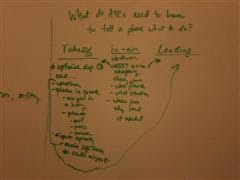Peace of mind isn't at all superficial to technical work. It's the whole thing.
Whenever I read Zen and the Art of Motorcycle Maintenance, it makes me want to study philosophy so I can better understand and critically evaluate the thought structure Pirsig lays out (the Metaphysics of Quality school of thought). The same thing that drives me to track down Euclid after reading Flatland, or search for more background information on almost every sidenote from T.S. Eliot's The Wasteland. Letting things rest unquestioned has never been a talent of mine. I have to consciously put things down, step back, and say "I'm going to be okay not understanding evvvvvvvvvverything about this right now." Otherwise I'd just keep following random intellectual threads and tangents, and I would be happy but not content because I wouldn't actually focus enough to get something concrete done.
Sometimes I don't say "stop" in time. I want to call that time fully worthwhile, as it's time spent learning interesting things, but the truth is that it often gets in the way of me completing the things I actually have to get done. I want to do everything, and I also want to have free time to wander... well, everything else.
It's a tragic combination of a sense of responsibility towards the whole world that makes it very difficult for me not to commit to things, an optimistic "hey, we can do that, it's not too bad" underestimation habit, and a perfectionist streak that wants to go overboard on... if not eating or sleeping, the vast majority of other things I do. All three are fantastic qualities that have gotten me to a lot of great places, and the perfectionism-random-wandering in particular is part of what I think makes me want to be an academic (intellectual exploration, yay!) and also why I worry about my ability to be one; sitting down and concentrating on something is not what I'm good at, to put it mildly. I can get lost in what I'm doing, but haven't learned how to have that kind of focus on command - it tends to just happen, and tends to happen a lot with things that aren't work.
Sometimes I wish I could just not sign up for anything for a semester, start playing with random things, and let my professors know a month or two in "hey, I... inadvertently ended up being completely obsessed with fractal mathematics this term, can I retroactively put that on my transcript? Look, computer simulations I've written!"
It feels like the different parts of my brain are wild horses that I have to continually keep in check - but which keep on charging forward, pulling me onwards in this glorious chaotic rush. Barely contained. Life is kind of like that; your greatest strengths are also your greatest weaknesses. They're the tiny things that keep you from exploding into greatness. It's like having a machine with a couple screws loose, or stuck, or out...
Right now this screw is worth exactly the selling price of the whole motorcycle, because the motorcycle is actually valueless until you get the screw out. With this reevaluation of the screw comes a willingness to expand your knowledge of it. --Zen and the Art of Motorcycle Maintenance



